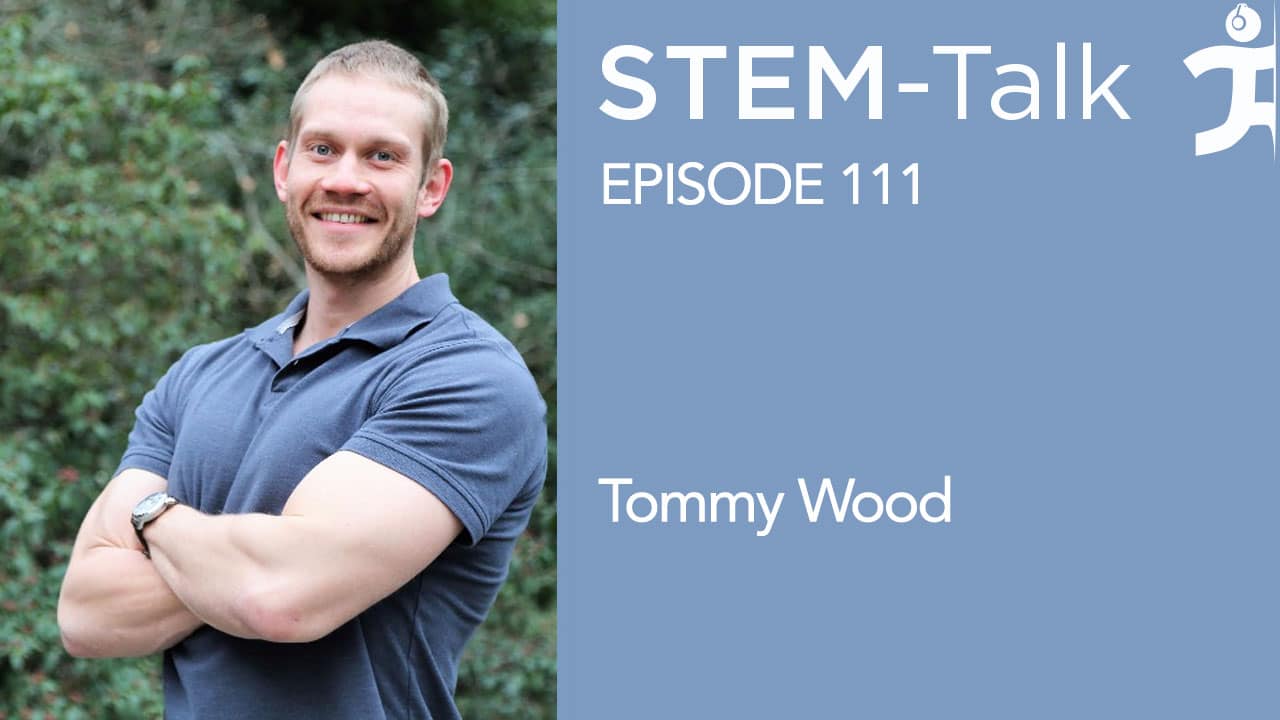STEM-Talk
Episode 111: Tommy Wood talks about lifestyle approaches to improve health span and lifespan
// Aug 27, 2020

Today we have the second of our two-part interview with Dr. Tommy Wood. Ken and Dawn talk to Tommy about his ongoing research into lifestyle approaches that can improve people’s health span, lifespan and physical performance. Tommy also talks about the physiological and metabolic responses to brain injury and how these injuries can have long-term effects on brain health.
In part one of our interview, episode 110, Tommy shared his thoughts on the research he has done on the importance of metabolic health as a way to for people to protect themselves from COVID-19. Tommy also talked about his work on developing accessible methods to track human health and longevity and his research on ways to increase the resilience of developing brains.
Tommy is a UK-trained physician who is also a colleague of ours here at IHMC. In addition to being a research assistant professor of pediatrics at the University of Washington in the division of neonatology, Tommy occasionally spends time at IHMC as a visiting research assistant. For a more detailed explanation of Tommy’s background, check out the introduction to part one of our interview, episode 110. We also recommend checking out Tommy’s earlier appearances on STEM-Talk, episodes 47 and 48.
Show notes:
[00:02:50] Dawn continues our interview with Tommy asking why some people refer to Alzheimer’s as type-3 diabetes. [00:05:00] Dawn refers to a chart that Tommy incorporated into his IHMC lecture in February of this year, which was part of a paper that showed how glucose responds with age. Dawn asks Tommy to walk listeners through what the chart details. [00:06:38] Dawn asks if Tommy agrees with Art De Vany, who in his most recent appearance on STEM-Talk, said that insulin resistance is associated with nearly every major disease that people worry about today. [00:07:38] Tommy talks about the mean amplitude of glycemic excursions and how this is the best predictor of cognitive functions. [00:09:31] Dawn asks about the waffle/fast-food study, and what the results of that paper mean for the effect of the modern American diet on health and cognitive ability. [00:11:00] Dawn asks about the effects of stress on memory and mood. [00:13:39] Dawn posits that we see many a public-service announcement about the dangers of smoking and alcohol consumption, and asks if the case could be made that we should also have public service announcements about the dangers of high blood sugar, as it is even more of a public-health issue than smoking and alcohol consumption. [00:15:42] Tommy transitions to talking about the importance of sleep in regards to brain health. [00:17:01] Ken mentions that in response to the common advice of getting eight hours of sleep, Tommy has made the point that perhaps more important than the number of hours is the quality of those hours of sleep. [00:20:15] Dawn asks Tommy about the use of Tylenol PM, or Ambien before bed for those people who have difficulty getting to, or staying, asleep. [00:22:07] Ken asks if it is true that muscle mass and body composition are exceptionally important in regards to brain robusticity. [00:24:43] Ken asks about Tommy’s favorite paper, “1,026 Experimental Treatments in Acute Stroke,” and why he loves this paper so much. [00:27:31] Tommy gives an overview of what happens as a result of an acute brain injury across the lifespan. [00:29:35] Tommy discusses Creatine, which is a compound derived from amino acids that has been shown to be effective in treating brain injuries. [00:32:56] Dawn asks Tommy what he has learned in terms of the overall therapeutic effects of ketones. [00:40:20] Dawn asks what would be one question that Tommy wishes health experts contemplated more often, in terms of health span, and what would be his answer to said question. [00:42:35] Dawn mentions that Tommy has done a lot of work helping individuals overcome chronic health conditions, and has thought about ways to scale these processes using digital means. Tommy gives advice to people seeking to develop scalable solutions designed to engineer sustained health. [00:45:33] Ken mentions that Tommy espouses an “ancestral” approach to supporting health, referring to the diet and lifestyle of our Paleolithic ancestors, and the influence that geography had on these factors for various populations of ancient people. Ken asks if there is reason to think that genetics influence the relative importance of animal foods and plant foods for brain health. [00:49:30] Dawn asks if the effects that animal husbandry has on climate change, which can contribute negatively on our health, outweigh the benefits that consuming animal products have for our health. [00:52:42] Dawn asks if there are any plant foods that support our brain health. [00:57:05] In regards to pro-longevity pharmaceuticals, which have not been very fruitful, Dawn asks if Tommy thinks that there are other factors regarding diet and lifestyle that can boost the healthspan more, and that people should be paying closer attention to, rather than waiting for a drug to extend their longevity. [01:00:53] Ken asks if Tommy has changed his thinking with respect to lifestyle determinants of health since his first appearance on STEM-Talk. [01:02:54] Ken brings up that Tommy often talks about the fact that the brain is capable of repairing itself and even growing as we age, but in order to do this it requires stimulation. Ken asks what are the best ways for people to stimulate their brains. [01:05:27] Dawn asks Tommy to explain why learning to walk is, cognitively speaking, more difficult than learning biochemistry, and how this relates to the demand-driven decline theory, as well as the grandmother hypothesis. [01:09:28] Dawn asks if Tommy is on his way to becoming a barbecue master, given his wife’s praises about his cooking. [01:10:38] Ken asks if Tommy ever craves fish and chips. [01:11:52] Dawn asks how Elizabeth is doing, now that she and Tommy share a home with two boxers. [01:14:05] Dawn mentions that a little birdy told us that in Tommy’s medical school yearbook, each person was assigned with a fictional disease, and that Tommy’s was the acronym SHHH. Dawn asks what SHHH stands for and if Tommy has changed at all since then.Links:
Two new papers by Tommy Wood:
The Future of Shift Work: Circadian Biology Meets Personalised Medicine and Behavioural Science






